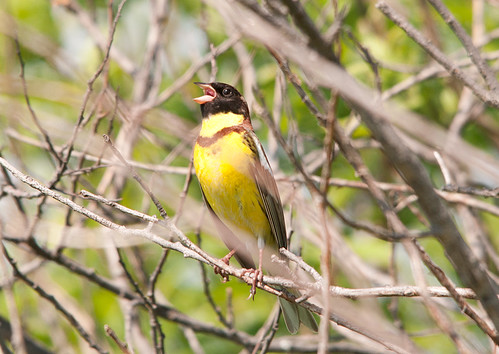歐亞鳴禽黃胸鵐(Emberiza aureola)曾經廣泛分布於東歐、俄羅斯、西伯利亞中西部和日本等地,現在卻被世界自然保育聯盟(IUCN)列入瀕危物種。
 |
| 圖說:黃胸鵐(Emberiza aureola)。攝影:Sergey Yeliseev。授權方式:(CC BY-NC-ND 2.0) |
中國濫捕 數量減少9成
黃胸鵐在中國俗稱為禾花雀,是很容易被獵捕的鳥類。根據一項跨國團隊的新研究,中國非永續的濫捕,讓禾花雀的數量大幅減少90%,分布範圍比1980年縮水了5000公里。
「以分布如此廣泛的鳥類而言,數量減少速度這麼快、幅度這麼大,是相當罕見的現象。上一次發生在1914年,旅鴿因大規模商業獵殺而滅絕。大規模的獵捕是禾花雀數量減少的主要原因。」研究主要作者、明斯特大學博士Johannes Kamp表示。
數量開始減少後,中國於1997年下令禁止捕捉。然而,至2013年仍有數百萬隻的禾花雀和其他鳴禽被捕食、流通於黑市。
在遷徙和過冬期間,禾花雀夜間棲息時會聚集成一大群,因此很容易大規模捕捉。英國國際鳥盟文宣主任Martin Fowlie博士解釋,一般是以網子捕捉禾花雀,作為中國人的盤中飧。
隨著東亞經濟和財富成長,禾花雀等鳴禽的食用量也越來越大。據估計,2001年光是中國廣東一省就吃掉1百萬隻。
緊急監控 建立通報系統
「為了扭轉禾花雀數量減少的趨勢,我們必須加強教育民眾食用野生動物的後果,也需要更有效率的通報系統以落實執法。」國際鳥盟資深保育官Simba Chan說,「越來越多證據顯示,亞洲鳥類普遍有同樣的存續風險。」
Fowlie建議中國、日本、南韓和俄羅斯制定一個新協議,先緊急合作監控這些地區的遷徙鳥類。
由於存續風險極大,《移棲物種保育公約》(the Convention on Migratory Species)已經同意為黃胸鵐訂定國際行動計畫,目標在2017年前恢復禾花雀的原分布範圍。
「過去10年,賞鳥活動在中國變得相當熱門。未來賞鳥客將在資料蒐集上扮演重要角色。」Simba Chan說。
A songbird once abundant from Finland to Japan, the Yellow-breasted Bunting, Emberiza aureola, has all but disappeared from Eastern Europe, Russia, large parts of Western and Central Siberia, and Japan. The cause of this decline is detailed in a new study – the easy-to-catch birds are being eaten by the millions in China.
New research published in the journal “Conservation Biology” shows that unsustainable rates of hunting, mainly in China, have contributed to the 90 percent decline and shrinking of the Yellow-breasted Bunting’s range by 5,000 km (3,000 miles) since 1980.
Dr. Johannes Kamp from the University of Münster, lead author of the paper
“The magnitude and speed of the decline is unprecedented among birds distributed over such a large area, with the exception of the Passenger Pigeon, which went extinct in 1914 due to industrial-scale hunting,” said Dr. Kemp. “High levels of hunting also appear to be responsible for the declines we are seeing in Yellow-breasted Bunting.”
During migration and on the wintering grounds, Yellow-breasted Buntings gather in huge flocks at night-time roosts making them easy to trap in large numbers. Birds have traditionally been trapped for food at these roosts with nets, explains Dr. Martin Fowlie, communications officer with BirdLife International in Cambridge, UK
Following initial declines, hunting of the species, known in Chinese as ‘the rice bird,’ was banned in China in 1997. However, said Dr. Fowlie, millions of Yellow-breasted Buntings and other songbirds were still being killed for food and sold on the black market as late as 2013.
Consumption of these birds has increased as a result of economic growth and prosperity in East Asia, with one estimate from 2001 of one million buntings being consumed in China’s Guangdong province alone, he said.
“To reverse these declines we need to better educate people of the consequences of eating wildlife. We also need a better and more efficient reporting system for law enforcement,” said Simba Chan, senior conservation officer at BirdLife International.
“There is growing evidence that these declines are part of wider problems for common Asian birds.”
Fowlie points to a new agreement between China, Japan, South Korea and Russia as a first step in developing an urgently needed coordinated monitoring of migratory birds across the region.
The situation is now so serious that the Convention on Migratory Species has agreed to develop an international action plan for the recovery of the Yellow-breasted Bunting throughout its range by 2017.
“In the last decade birdwatching has become increasingly popular in China. Birdwatchers will play an important role in future data gathering,” said Chan.






